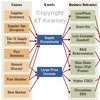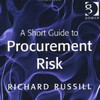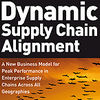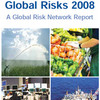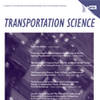 The other day I received an email from the editorial board of Transportation Science, asking me to review an article that had been submitted for publication. Transportation Science promotes itself as the foremost journal in the field of transportation analysis, and is published quarterly by INFORMS, so I felt quite honored. This is not the first time I’ve been asked to review a journal submission, but every time is still a new experience.
The other day I received an email from the editorial board of Transportation Science, asking me to review an article that had been submitted for publication. Transportation Science promotes itself as the foremost journal in the field of transportation analysis, and is published quarterly by INFORMS, so I felt quite honored. This is not the first time I’ve been asked to review a journal submission, but every time is still a new experience.
And it’s always interesting to look at the submission in question and ask myself why was I picked as a referee. Sometimes it is because the article topic is linked to my own research, or maybe because some of my work is listed in the bibliography or references, meaning that the author and I may have some common ground on which my review can be based.
One, I check the homepage of journal I am supposed to review for, to see what their topics are, or read some articles, just to get a clearer picture of what they are looking for. After all, part of being a referee is ensure that the submitted article is suitable and worthy of being published in that particular journal.
Two, I check the editor who sent me the submission, usually found on the homepage of the university the editor is working at. Referee requests don’t always come form professor, but mostly yes. What are his/her research interests, giving me another clue as to what he/she may be looking for in me as a referee.
Three, the paper. A cursory read at first, does it catch my interest? If yes, this will be a fun review, if not, well…Then, browsing the references, do I recognize them? If yes, I am much more likely to give a thorough review than if not, because if not I will probably have to read them as well.
Four, the paper again, this time in detail. Even if I am not familiar with the subject at all I will try to follow in the footsteps of the author, sentence by sentence. Sometimes this can be hard, sometimes I have to confess to just grasping the general idea. That is still ok, I cannot know everything, but I should at least be able to understand most of what is said. Does it make sense, is the argument clear, are comparisons with related research correct (to my knowlegde), does it provide new insights, new angles, new perspectives. If not, my task is to point at where things could be made clearer or where there is an obvious lack of understanding or argument or maybe there are some seminal references missing. Reading the references will often tell me more about the paper than the paper itself.
Five, the nitty-gritty stuff like layout, grammar, spelling. Yes, that too is part of the review. You don’t want your article to be published with typos or grammatical errors.
And last not least, I hope that the authors of the papers and research articles that have been reviewed by me have learned from my remarks. Unfortunately I will never know, because needless to say, the process of peer-reviewing is anonymous, sort of. I get to see the author of the paper, but he or she does not get to see my name on the review he or she receives.
A review like this can take anything from just a couple of hours to days, but I find it fun and rewarding. I have yet to review a paper that hasn’t taught me something new. That’s why I like doing it.

